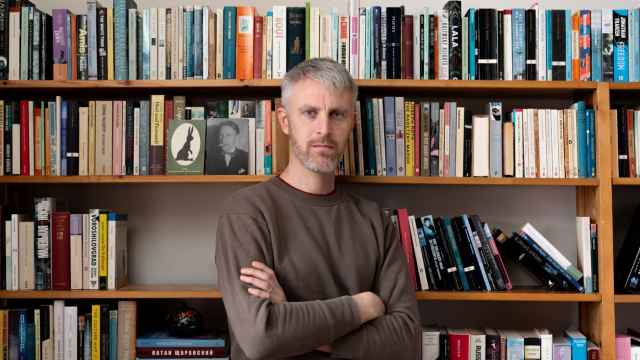Western music has taken over Russian tastes since the fall of the Soviet Union, and most foreign bands can be assured of a warm welcome when they come here. However, due to low revenues and stereotypes about Russia, big-name bands have often avoided the country or come only to Moscow or St. Petersburg.
Stanley Jordan is an exception to this rule, a well-known American jazz musician who has come to Russia numerous times and played in cities all over Russia's regions, from Vladivostok to Arkhangelsk.
"I have had some very good responses from audiences in Russia," Jordan said in an interview last week with The Moscow Times. Jordan was in Moscow in early October for his fourth trip to Russia in one year and is planning to play concerts in Belarus and Georgia as well. "It is good for me. I enjoy playing in the big cities and the smaller towns so I get some variety," Jordan said.
Jordan described how, many years ago, a Russian woman had once recommended that he play in Russia, promising that he would find audiences more enthusiastic than anywhere else. For some time, Jordan had not bothered to heed this advice, yet upon coming to Russia after the collapse of the Soviet Union, he discovered it to be largely true.
Since then, Jordan has returned to Russia frequently, building up a fan base that request his concerts and help him find venues. Asked what it was that made Russians such an enthusiastic audience, Jordan was reluctant to specify any one characteristic.
"Every place is different, and even every audience in the same venue," Jordan said. "Part of what I try to do is really feel the audience every time, to connect with the people who are there." This improvisational aspect of Jordan's playing makes every performance unique and is one of the reasons why responsive audiences like those in Russia are so important.
Improvisation is not the only thing that sets Stanley Jordan apart from other musicians. A Princeton-trained scholar of music, Jordan has followed a path very different from many other jazz musicians. While a student of music theory, Jordan studied with composer Milton Babbit and also worked with computer music pioneer Paul Lansky.
Jordan's forays into computer music may be his most widely heard contribution to music, though few listeners know his name: Jordan actually made the startup music for many early Macintosh computers.
Throughout his career, Jordan has used his unique background to strive for musical innovation. Jordan actually invented a new method for playing the guitar, the "touch technique."
While most guitarists use two hands to play guitar chords, Jordan discovered that by quickly hammering his finger down on a single fret, the force of the impact could create sufficient vibration to sound the chord without the string being plucked.
With his frequent touring of Eastern Europe, Jordan has helped bring his varied new styles to open ears and has likely inspired new generations of Russian musicians.
Contact the author at g.golubock@imedia.ru
A Message from The Moscow Times:
Dear readers,
We are facing unprecedented challenges. Russia's Prosecutor General's Office has designated The Moscow Times as an "undesirable" organization, criminalizing our work and putting our staff at risk of prosecution. This follows our earlier unjust labeling as a "foreign agent."
These actions are direct attempts to silence independent journalism in Russia. The authorities claim our work "discredits the decisions of the Russian leadership." We see things differently: we strive to provide accurate, unbiased reporting on Russia.
We, the journalists of The Moscow Times, refuse to be silenced. But to continue our work, we need your help.
Your support, no matter how small, makes a world of difference. If you can, please support us monthly starting from just $2. It's quick to set up, and every contribution makes a significant impact.
By supporting The Moscow Times, you're defending open, independent journalism in the face of repression. Thank you for standing with us.
Remind me later.





